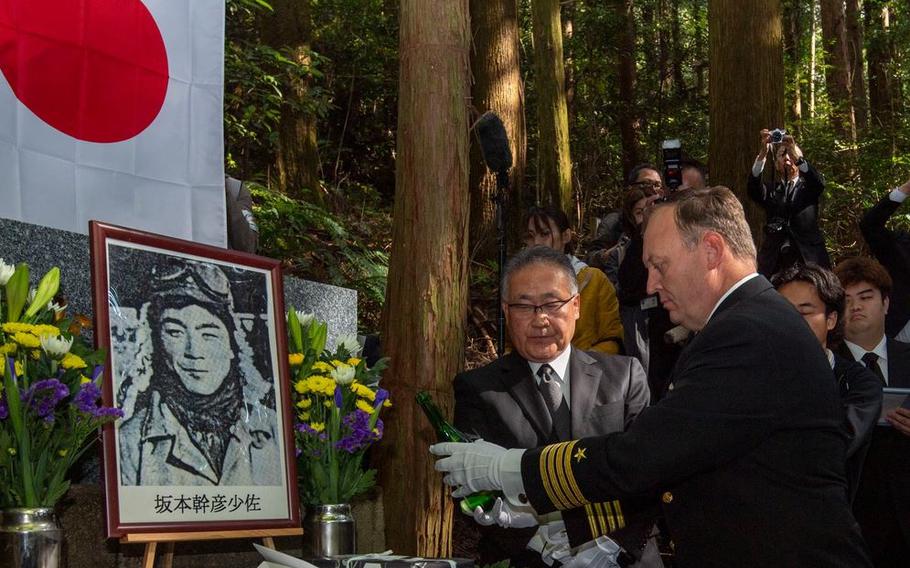Community News
CFAS participates in 80th Anniversary WWII B-29 ‘Acid Test’ Memorial Ceremony
Commander, Fleet Activities Sasebo November 28, 2024

Capt. Michael Fontaine, Commander, Fleet Activities Sasebo, pays homage to the fallen by pouring sake on the downed “Zero” fighter pilot commemorative site during a memorial ceremony held in Isahaya, Japan Nov. 21, 2024. The ceremony commemorated four Imperial Japanese Navy “Zero” fighter pilots and the 11-man crew of a U.S. Air Force B-29 that were lost in an air battle over Isahaya 80 years ago. (Mass Communication Specialist 3rd Class Raquell Williams, U.S. Navy)
SASEBO, Japan (Nov. 27, 2024) – Capt. Michael Fontaine, Commander, Fleet Activities Sasebo (CFAS), Command Master Chief Alan Benavidez and 12 other CFAS personnel along with citizens of Isahaya, Japan and members of the Japan Maritime Self-Defense Force (JMSDF) Fleet Air Wing 22 attended a memorial ceremony commemorating the 80th anniversary of the loss of the 11-man crew of the U.S. Army Air Force B-29 Super Fortress heavy bomber “Acid Test” and four Imperial Japanese Navy fighter pilots Nov. 21, 2024. The Japan-America Friendship Memorial Service Society comprised of local citizens organized the commemoration for the crews of a B-29 heavy bomber, the Japanese fighter which rammed it and three other pilots who gave their lives during a battle over Isahaya City, located in Nagasaki Prefecture, Japan in World War II.
80 years ago, on Nov. 21, 1944, the U.S. Army Air Force 462nd Bombardment Group was sent to attack targets in Omura City, Japan. During their return flight, they were set upon by Japanese fighter planes. In the battle that ensued, three Japanese fighters were shot down and Capt. Joseph Killebrew’s B-29, nicknamed “Acid Test”, was rammed over Isahaya City by a Japanese fighter plane piloted by Imperial Japanese Navy Lt. Cmdr. Mikihiko Sakamoto. Which resulted in both aircraft crashing in the Isahaya area, killing the pilots and crew of both aircraft.
“May they rest in peace and find comfort in the fact that the United States and Japan today are stalwart allies,” said Fontaine. “The U.S. military and Japan Self-Defense Forces are partners dedicated to peace and Americans and Japanese live in harmony bound by the bonds of friendship and family.”
In 1992 and 1993, Isahaya residents erected a memorial for Sakamoto and the B-29 Crew, at each crash site respectively, and have held a memorial ceremony approximately every ten years to remember the sacrifices of service members and civilians on both sides who gave their life during the war. This year, three additional Imperial Japanese Navy pilots who had been confirmed to have been killed in action during the air battle were included in the memorial ceremony for the first time.
“When I stand in front of this monument, I still feel deep sadness for those who died in the war in distant lands, wishing for peace and development of our country and for their loved ones,” said Isahaya City Vice Mayor Naoko Ishibashi, on behalf of Mayor Yukishige Ookubo.
At each of the memorial sites, ceremony attendees poured alcohol on the cenotaphs, a Japanese religious ritual that offers a drink to the souls of the deceased. On the Japanese monument, Japanese sake from Sakamoto’s hometown of Karatsu City in Saga Prefecture was used. Having found a bottle of Jack Daniel’s Tennessee Whiskey in the crashed B-29, the local community members brought the same brand of whiskey to be used in place of sake to honor them with a drink they preferred. Additionally, they laid flowers at a table with photos of the deceased and offered words of condolence.
“When I think of the heroes of Japan and the U.S. who died for their country and their families with no personal grudge,” said Japan Maritime Self-Defense Force Rear Adm. Katsuya Suzuki, Commander, Fleet Air Wing 22. “I cannot help but feel the tragedy of war once again. We must not forget that the peace and prosperity of the United States and Japan today is built on the sacrifices of these heroes.”
The ceremony was also live streamed and viewed remotely from the United States by Emily Link Miller (Killebrew), the 80 year-old daughter of Capt. Killebrew. Miller, who never met her father, was born while Killebrew was deployed: five months prior to his death in 1944.
During the ceremony, Fontaine read aloud from a letter Miller had written to the people of Isahaya City, “The kindness and respect shown by the Japanese people to my father and his crew is so incredible that I hardly know what to say except thank you. That you continue to honor my father, his crew, and Mikihiko Sakamoto with memorial gardens and events is a monument to the peace and friendship between our two nations.”
Those remembered were Imperial Japanese Navy Lt. Cmdr. Mikihiko Sakamoto, Ens. Masaaki Kawahara, Warrant Officer Yukio Sawada, Warrant Officer Sadaharu Shimizu and U.S. Army Air Force Capt. Joseph Killebrew, 1st Lt. Paul Meeks, 1st Lt. Emsley Eggers, 1st Lt. Earl Heins, 2nd Lt. Spirito Ovial, Staff Sgt. John Normand Jr., Staff Sgt. Edward Morrow, Staff Sgt. Vincent Sheridan, Staff Sgt. Luther Young, Sgt. Gail Cornelius and Sgt. Gordon Chard.